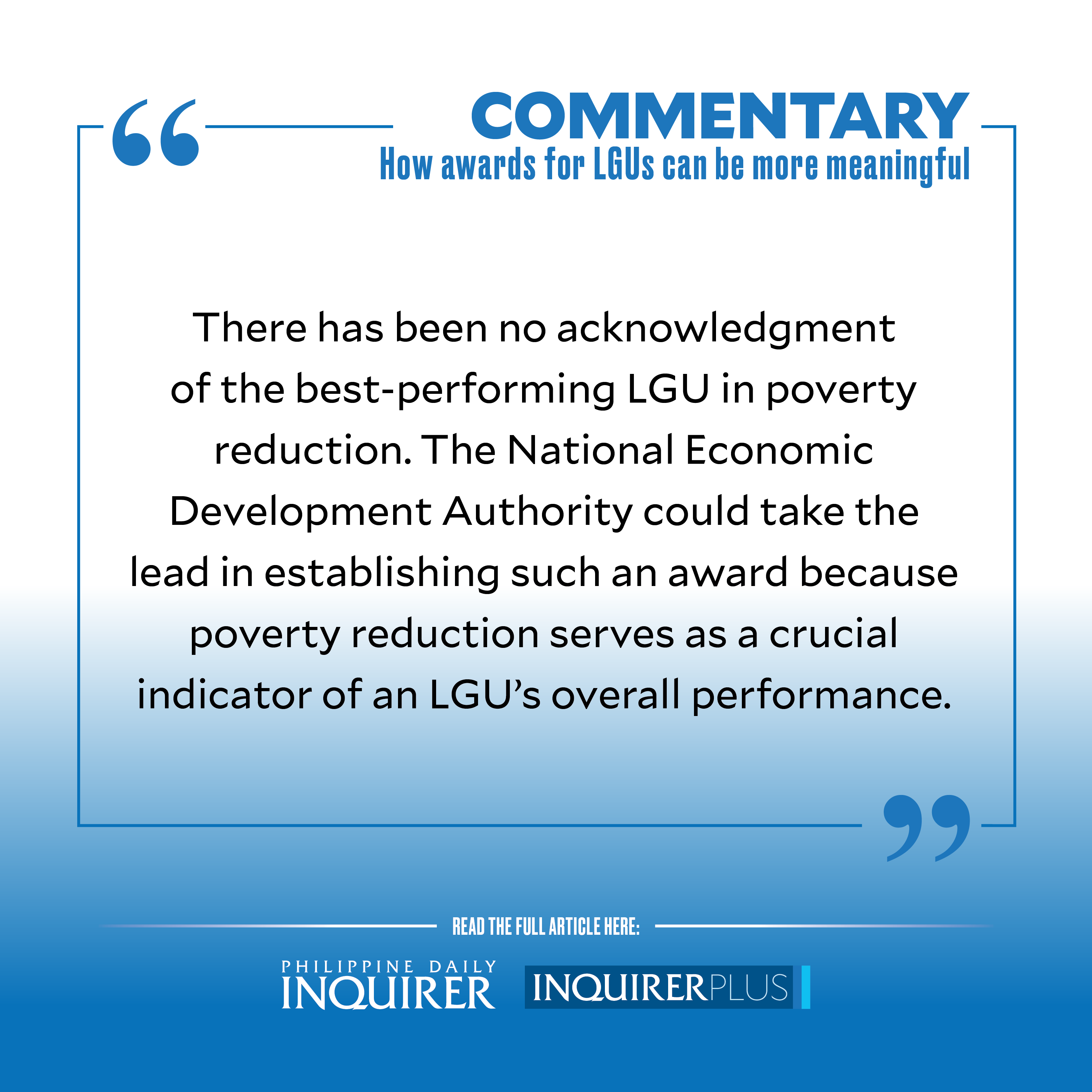How awards for LGUs can be more meaningful

Various awards have been conferred on local government units (LGUs) by government agencies and private entities. The accolades aim to recognize their outstanding work in specific fields based on predetermined criteria.
Included here is the eGov Awards, which commends exemplary work “in integrating [information, communication, and technology (ICT)] as part of good governance strategies.” Presented by the National ICT Confederation of the Philippines in collaboration with the Department of the Interior and Local Government, this award acknowledges LGUs for their innovative practices in the ICT sector. The Galing Pook Award meanwhile recognizes innovative practices by LGUs that demonstrate “winning programs [as] models of good governance promoted for adoption by others.” For its part, the Department of Education “honors outstanding [LGUs] and nongovernment organizations (NGOs) for their efforts in universalizing literacy in the country.”The Department of Finance’s Bureau of Local Government Finance acknowledges top-performing LGUs in local revenue generation. The Philippine Chamber of Commerce and Industry’s Most Business-Friendly LGU Award commends LGUs for “instituting good governance reforms that enhance competitiveness in local trade and investments.”
Then there’s the Most Competitive City Award presented by the Department of Trade and Industry that “hinges on five key pillars: economic dynamism, government efficiency, infrastructure, resiliency, and innovation.” Competitiveness is assessed based on productivity (output per unit of input). The rationale behind enhancing productivity is defined as a means to improve living standards and achieve prosperity for all constituents.
Despite such recognition, there has been a notable absence of awards for LGUs demonstrating exemplary performance in reducing poverty incidence. Specifically, there has been no acknowledgment of the best-performing LGU in poverty reduction. The National Economic Development Authority could take the lead in establishing such an award because poverty reduction serves as a crucial indicator of an LGU’s overall performance.Poverty reduction signifies the impact of good governance as reflected in the inclusivity of its strategies. It demonstrates the trickle-down effect of an LGU’s exemplary performance, and sheds light on its programs, projects, and strategies aimed at improving the well-being of all constituents, especially the disadvantaged. Furthermore, it can be used to bolster requests for national or foreign funds for development initiatives.
The reduction of poverty incidence in an LGU can validate as well the claims by NGOs, cooperatives, and like entities, of improvement in the economic conditions of beneficiaries and their communities. The LGU receiving the award thus becomes a model of good governance showcasing good practices in the specific field for which it has been recognized. The Most Competitive City Award explicitly highlights that enhancing productivity leads to improved living standards and prosperity for all.
From my perspective, a highly competitive city, whether component or highly urbanized, showcases economic growth, improved infrastructure, and enhanced public services. As a result, potential benefits for city constituents, particularly the economically disadvantaged, must encompass “increased job opportunities leading to more stable sources of income; enhanced access to quality education facilitated by improved educational institutions and facilities; improved health outcomes through better access to medical services; enhanced mobility and connectivity, making it easier to reach jobs, schools, and essential services; a safety net for poor families through improved social services; improved access to basic services like water, sanitation, and electricity; more opportunities for constituents to start their own businesses; implementation of community development programs targeting poverty reduction; improved access to free cultural and recreational opportunities, and a reduced crime rate resulting in a safer environment for all constituents.”Nonetheless, the actual benefits to poor families depend on the effectiveness of local governance, social policies, and the inclusivity of development strategies. The city government must prioritize pro-poor initiatives addressing the specific needs of indigent constituents, while ensuring inclusive growth to maximize the positive impact of competitiveness on their lives.
Otherwise, competitiveness risks becoming inconsequential and meaningless for the city’s poorer constituents. This concern also applies to other awards bestowed on LGUs.
—————-
Nono Felix worked for an international NGO as a corporate planning, monitoring, and evaluation manager, covering 13 Asian countries.




















